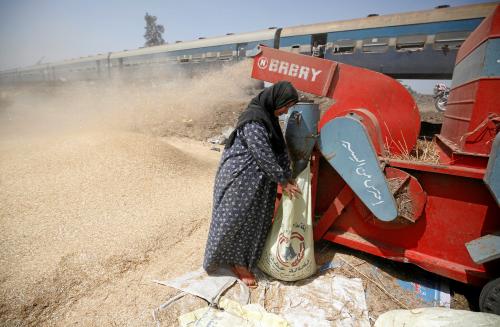

Past Event
The twin forces of technological change and globalization are reshaping the global economy. Nowhere are their effects more pronounced than in labor markets. Considerable attention is now being devoted to analyzing and anticipating changing patterns of employment and wages in advanced economies. Yet the implications for developing economies are even more consequential given the necessity of productive jobs for people to escape poverty.
The 13th Brookings Blum Roundtable will examine the future of work in the developing world: the jobs that will dominate labor markets and the terms of employment; the skills they demand and how those skills will be acquired; and the implications for development and society.
The Roundtable will be guided by three overarching questions: How will the world of work change in the next 15 years, how can workers and companies from developing economies compete, and how can workers’ rights and benefits be maximized? What are the most promising innovations to support skills acquisition and certification, job matching, and talent identification? What policies and investments should governments, corporations, educators, and donors prioritize to prepare for this future?
Related Content

Kemal Derviş
July 28, 2016

August 1, 2016
9:00 am - 10:30 am
Over the past generation, the world of work in developing economies has been defined by its growing connection with investors and consumers in the rich world, providing opportunities that have helped drive income convergence and a stunning fall in global poverty. The next 15 years promise to be more turbulent. By one estimate, more than half of existing jobs in the developing world are at risk of being automated during a period when the labor market is expected to expand by half a billion people. Meanwhile, growing inequalities are evident between skilled and unskilled workers, and between workers and capital owners. How do the factors driving change in the future of work apply in the developing world? Does automation fatally undermine developing countries’ comparative advantage in unskilled labor? Where are the biggest opportunities for job creation?
Panelist

10:50 am - 12:20 pm
The threat of automation implies a race between technology and workers in the mastery of skills. Yet the ability of workers to compete is handicapped by the poor performance of traditional education systems in much of the developing world. Research points to a growing mismatch between the demand and supply for skills that holds back economic growth. Should developing economies focus on nurturing STEM skills needed to develop and work with technology, or creative, social, and perception skills that are least vulnerable to automation? What are the most promising models of education and vocational training that can deliver these skills? How should the development of skills be financed?
9:00 am - 10:30 am
Digital platforms have the potential to radically improve the efficiency of job searching and matching, both for local businesses and international companies hiring workers in developing countries. Many incorporate new approaches to certifying qualifications and capabilities. In which sectors of the economy, or segments of the labor market, can digital job searching and matching solutions be most transformative? How far can these solutions go in addressing the shortage of skilled workers reported by firms in developing economies? With a growing premium on skilled workers, how can talent be retained?
Moderator

10:50 am - 12:20 pm
Labor markets in the developing world are characterized by high informality, low union membership and social protection. This poses profound challenges to long-term socio-economic development. The rise of internet-based gig economy work offers a hypothetical path by which these effects might be mitigated in the developing world—in sharp contrast to the industrialized economies where the gig economy is seen as an exacerbating force. Are new business opportunities from the gig economy sufficiently productive and profitable to encourage firms to join the formal sector? Should developing countries depart from developed countries in their approach to the provision of worker benefits and protections? How will changes in the world of work affect women, inequality and social mobility?
8:40 am - 10:10 am
The integration of global markets and the rise of internet-based platforms has spawn new lines of business using innovative business models. Automation, outsourcing, and the rise of the gig economy augur further changes for new and existing companies in the developing world. What characteristics will define the business models of the future? In what lines of work is there greatest scope for further outsourcing and offshoring to the developing world? Where do private investors see the best opportunities for growth?
10:20 am - 11:50 am
Despite the priority placed on jobs by developing country citizens and their governments, the development community – donors, NGOs, foundations – has engaged only tepidly with the jobs agenda. Do existing donor interventions to support the jobs agenda work? In what areas can the development community usefully research, invest, advise and experiment today to help prepare developing economies for the future of work? Should the development community partner with corporations on this agenda and if so, how?
Moderator
Panelist



Albert Zeufack
February 24, 2026

Landry Signé
February 20, 2026

Richard Newfarmer
February 19, 2026